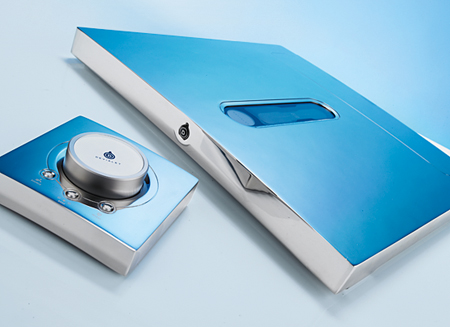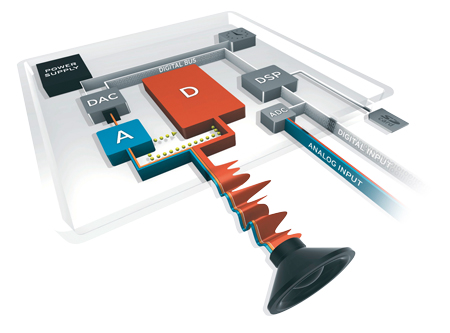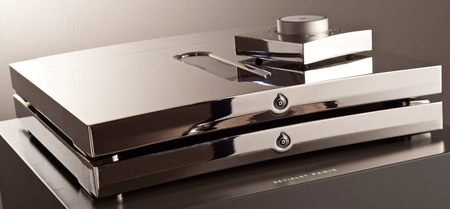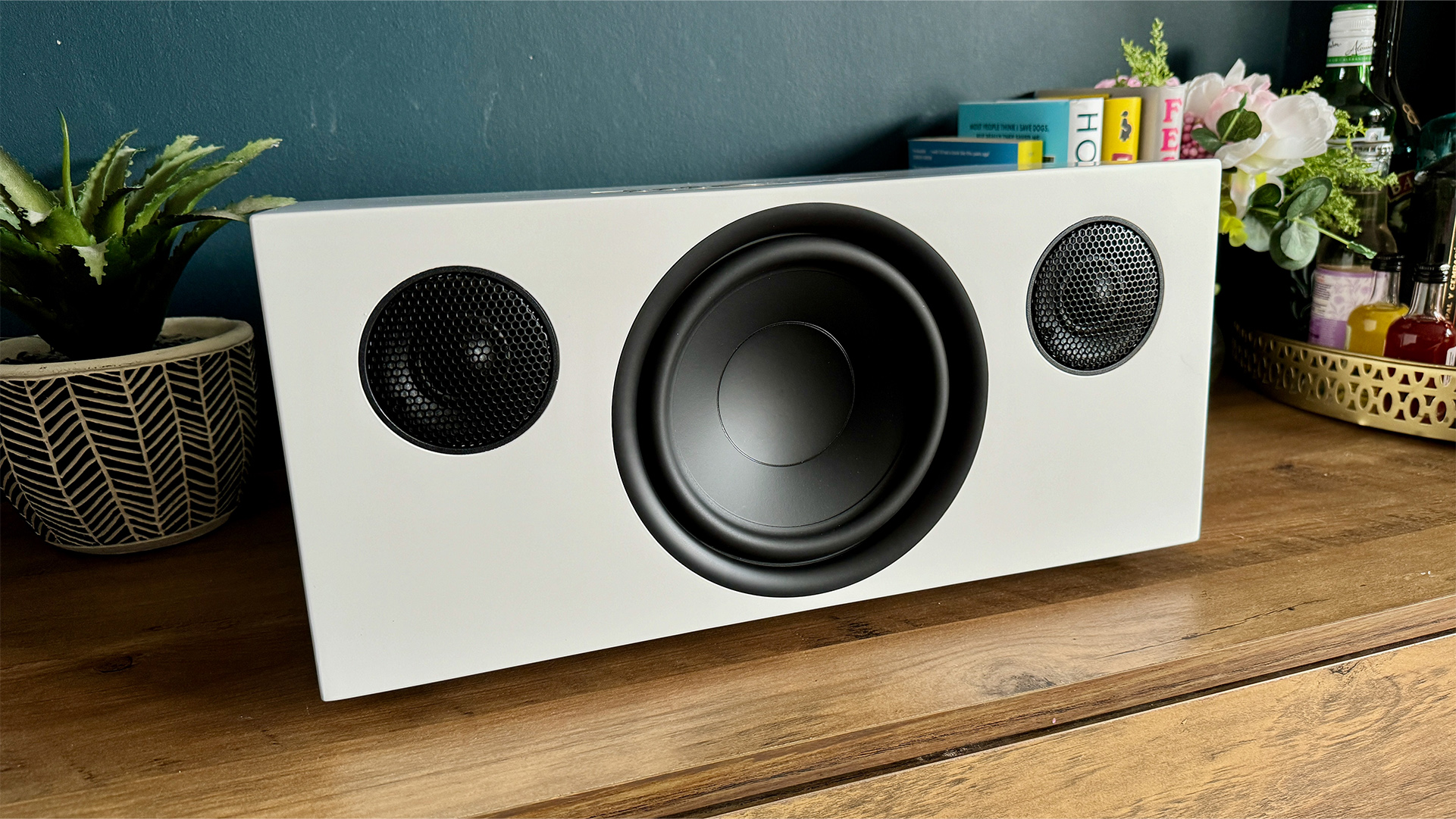What Hi-Fi? Verdict
This fresh look at amp design offers exceptional sound, features and aesthetics
Pros
- +
Immaculate sound
- +
wireless operation
- +
sleek design
- +
configurable nature
- +
nice remote
Cons
- -
Some might want a more dramatic sonic presentation
- -
small display
Why you can trust What Hi-Fi?
'What is it?' – that’s the question almost everyone asked when they saw the Devialet D-Premier in our listening room.
That reaction’s understandable when confronted by such a startlingly original piece of hi-fi design: the D-Premier looks like nothing else because it really is like nothing else.
However, take a look at its headline features and it appears no more than a well-equipped stereo integrated amp with digital, line-level and phono inputs, although Devialet has recently developed a system to let it stream wirelessly from a computer, too.

Devialet D-Premier: intriguing internal design
That’s an unusual combination of abilities, but they’re not what makes this product special: to discover what sets it apart, you need to take a look inside the sleek case.
For while almost every amp ever made has been based on one of a handful of circuit structures – yes, there are detail changes, and they affect performance massively, but the architecture doesn’t alter much – we suspect that if a competent audio engineer was presented with the circuit layout of the D-Premier it would take them a good while before they figured out what it actually did.
You see, in configuration and detail it’s a truly fresh take on how an amplifier should be designed in an era where digital sources dominate: the heart of the D-Premier design is the combination of a low-power Class A amplifier and muscular Class D partner working in tandem.
That’s a mighty difficult task to accomplish. The idea is to combine a high quality Class A sound with brute power (240W per channel in this case) and high efficiency.
The internal workings are all in the digital domain, so all input signals, including those from a record player, are converted to digital before being processed, this approach meaning the amp is highly flexible: the neatly hidden inputs on the rear are configurable, so you can decide which source you want to connect.
It doesn’t matter if it’s analogue or digital: the amplifier will cope with both, and thanks to a high-res digital output capability you could even use it as a means of digitising your LP collection, with the addition of a computer running suitable software.
Devialet is particularly proud of its new wireless system, Devialet AIR, claiming it to be the best-sounding way to connect to the D-Premier. Just add a fully functioning home network and off you go.
Rather than a conventional DLNA/UPnP system, Devialet uses dedicated AIR software installed on a MAC or PC home computer to stream directly over the network to the amp.

Devialet D-Premier; wireless performance
The sound is very good, though we’re not totally convinced by Devialet’s claim above. However, the freedom wireless operation gives makes it the natural choice of connection for those wishing to use their computer as the main music source. There are no great sonic penalties for doing so.
At the time of writing, Devialet’s wireless system won’t stream higher than CD resolution (16-bit/44.1kHz), but this is set to change when planned free software upgrades will raise the upper limit to 24-bit/96kHz and then to full-fat 24-bit/192kHz by the end of the year.
Physically the D-Premier is compact for an high-end amp, its clever internal circuitry making for a slim design that no rival we’ve seen can imitate. It can be placed flat, in a conventional manner, or even hung on a wall, the small (though impressively clear) display rotating to accommodate the range of placement positions.
The remote is a pleasingly luxurious design with a well-weighted volume control, but It would be nice to have volume and source indication on the remote itself, as that on the amp is too small to see at a distance, and goes out of view if the unit is placed flat.
Devialet D-Premier: analogue quality
We were intrigued by the D-Premier’s digital design and so chose to make its life as difficult as we could by starting our test with that most analogue of sources, the record player.
With the amp configured for a moving coil cartridge, and our Clearaudio Innovation Wood package pushed into service, the results are good.
Noise (hiss specifically) is quiet; way quieter than any dedicated phono stage we’ve come across. And listening to a range of recordings from The XX’s award-winning debut set to Holst’s Planets gave a consistently impressive sound.
The D-Premier specialises in clarity. It reveals a staggering amount of fine detail and renders the leading and trailing edges of notes with astonishing certainty, the overall impression being one of immense grip and transparency.
Yet, despite all the analysis, the Devialet refuses to sound clinical. It conveys emotion with the best, and to a large extent conveys subtle timing interaction between instruments well. Some might want more drama, but for us the D-Premier is still entertaining.
Move to line-level sources such as CD and the presentation remains tonally neutral and detailed, sounding as taut as you like. Complex basslines are rendered with real power and a large dose of finesse.
It deals with low frequencies with impressive ease, too – and while it goes loud, it stays composed even when pushed hard. Should the 240W per channel output not be enough you can daisy-chain multiple D-Premiers to your heart’s content.
In the same way as configuring the digital/analogue input selection, this is done using a computer-based Configurator available on the company's website, and SD cards to program the amp.

In mono form the D-Premier delivers 400W – at Devialet’s HQ we heard a monobloc system driving a pair of £80K Magico speakers with striking results.
Devialet D-Premier: a stunning achievement
There’s no denying that the D-Premier is a stunning achievement. Its innovative design and sleek aesthetics are a breath of fresh air in what is a massively conservative part of the market, while the wireless capability and configurability show the company has thought carefully about what the customer really needs, and the amplifier’s sound is equally impressive.
True, its analytical sonic approach won’t suit everyone, but there’s no denying it’s hugely capable.
See all our amplifier Best Buys
What Hi-Fi?, founded in 1976, is the world's leading independent guide to buying and owning hi-fi and home entertainment products. Our comprehensive tests help you buy the very best for your money, with our advice sections giving you step-by-step information on how to get even more from your music and movies. Everything is tested by our dedicated team of in-house reviewers in our custom-built test rooms in London, Reading and Bath. Our coveted five-star rating and Awards are recognised all over the world as the ultimate seal of approval, so you can buy with absolute confidence.


